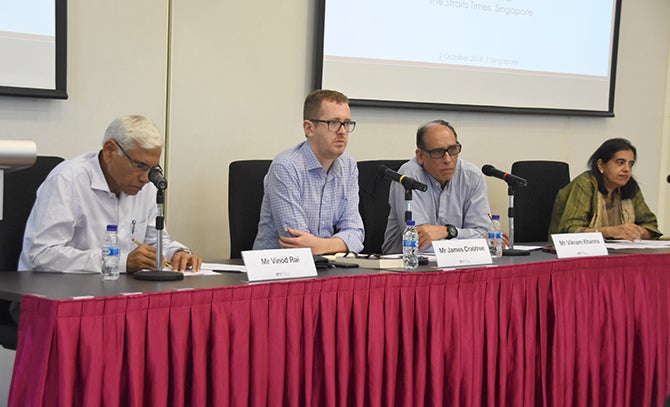
| Event Title: | The Billionaire Raj: Business, Corruption and Growth in India and Beyond |
| Topic: | ISAS Panel Discussion |
| Date/Time: | 02 October 2018 | 15:30 - 17:30 |
| Venue: | MEI Conference Room, Level 6 (Block B), 29 Heng Mui Keng Terrace, Singapore 119620 |
| Speaker/s: | Multiple Speakers |
| Description: |
The session explored inequality and cronyism in India amidst its rapid economic development which is characterised by extremes of wealth creation and unstable industrial growth. The first panellist, James Crabtree argued that post-1991, as India pursued liberalisation, and as economic growth picked up pace, the proceeds of that growth went disproportionately to the very top. This has resulted in the creation of a super-rich class and a heightened disparity between the rich and the poor. He attributed the rise of billionaires to entrepreneurship embellished in political connections, crony capitalism, and corruption scandals – which he alleged allowed them easy access to large loans from public sector banks. These scandals received strong reactions from the public and resulted in the election of Modi on an anti-corruption platform. However, Crabtree argued cronyism, nepotism and excesses of India’s billionaire class have continued, with newer dynasties joining the ranks of this small and powerful elite. He made particular mention of the weak banking system in India where the Modi government has had the weakest records. Nonetheless, Crabtree concluded with cautious optimism for India’s future and remarked that just as America’s and Singapore’s gilded age preceded the policies to remedy inequality, he foresees India riding into a more just and less corrupt future as it passes this period.
Mr Vinod Rai discussed how cronyism rose in India in recent years. He attributed it to the involvement of corporate entities on electoral campaigns. In return of their support, contracts and licences are given to these entities, irrespective of their domain capabilities. These companies then borrow huge amounts of money from banks who are encouraged to lend for infrastructure projects. The monies are not necessarily put into the projects that are apportioned to them. He also stated that the same phenomenon is true about regional political partners of coalition governments. These parties have their own affiliation to corporate entities that support them. Most regional ministers who were acquitted by the trial court in this regard in recent years indicated that they had informed the PMO about their plans. Furthermore, large number of infrastructure projects which required statutory clearances from the government did not get through clearances, even when they were genuine. So, time over-runs lead to cost-over runs. Today, India has about nine trillion rupees stuck in bank loans. In an attempt to solve this problem, Rai explained that Indian Supreme Court has recently introduced an electoral reform whereby politicians, their spouses and associates have to file affidavits on their assets and sources of income at the time of filing nomination papers. He also stated that there is a growing political vigilantism among Indian citizen, who have started asking the right questions to government – which may also help to curb cronyism in the country. |
| Youtube: | https://youtu.be/JAJ3nWAyYGw |


